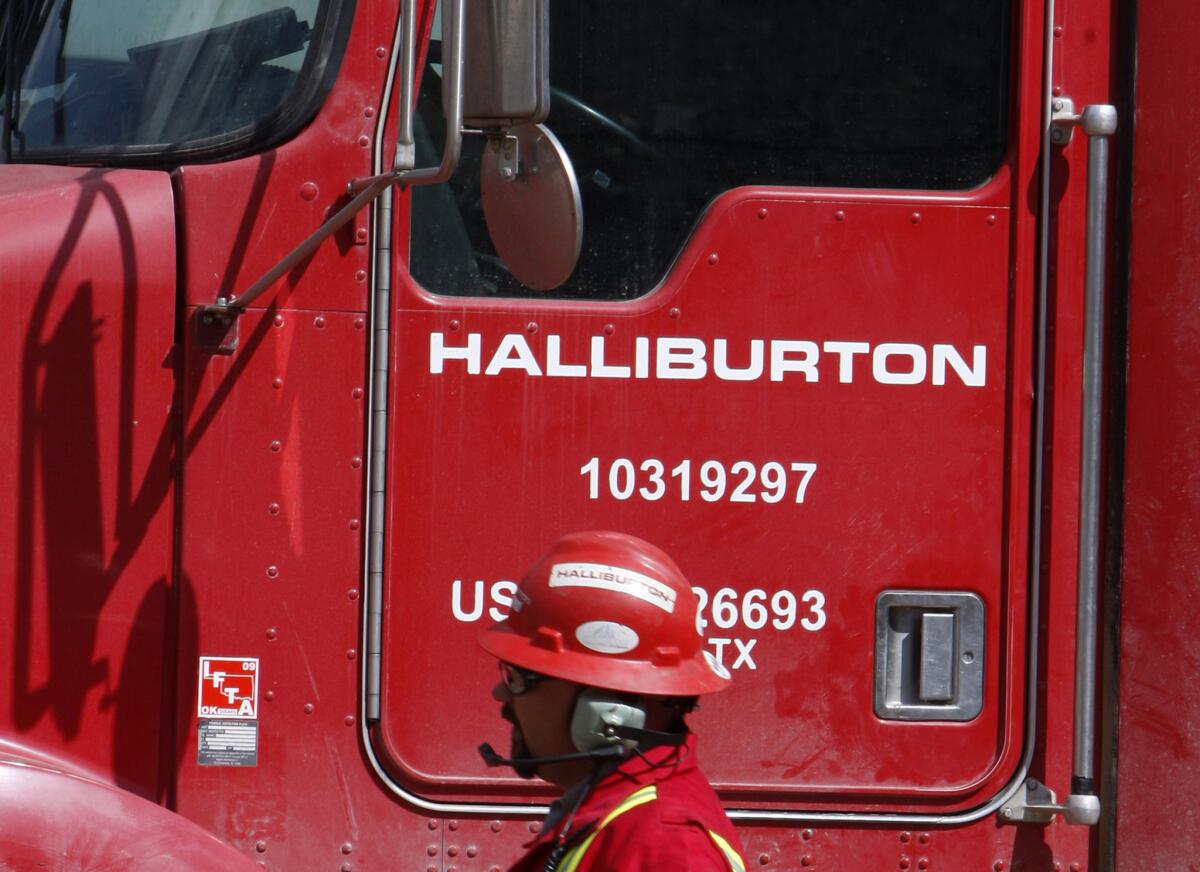Halliburton and Baker Hughes abandon their $34-billion merger

A worker passes a Halliburton truck in Rulison, Colo., in 2009.
Two companies crucial to the business of U.S. energy exploration — Halliburton Co. and Baker Hughes Inc. — have abandoned their planned $34-billion merger.
The companies and the Justice Department disclosed the plans Sunday.
The department filed suit April 6 to block the merger of Halliburton and Baker Hughes. It claims the transaction would unlawfully eliminate significant competition in almost two dozen markets crucial to the exploration and production of oil and natural gas in the United States.
“The companies’ decision to abandon this transaction — which would have left many oilfield service markets in the hands of a duopoly — is a victory for the U.S. economy and for all Americans,” Atty. Gen. Loretta E. Lynch said in a statement Sunday.
Justice officials said the merger of Halliburton and Baker Hughes would have raised prices, decreased output and lessened innovation in at least 23 oilfield products and services critical to the nation’s energy supply.
As part of the agreement, Halliburton will pay Baker Hughes the termination fee of $3.5 billion by Wednesday, according to a joint release from the companies.
“While both companies expected the proposed merger to result in compelling benefits to shareholders, customers and other stakeholders, challenges in obtaining remaining regulatory approvals and general industry conditions that severely damaged deal economics led to the conclusion that termination is the best course of action,” said Dave Lesar, Halliburton’s chairman and chief executive.
“Today’s outcome is disappointing because of our strong belief in the vast potential of the business combination to deliver benefits for shareholders, customers and both companies’ employees,” said Martin Craighead, Baker Hughes’ chairman and CEO.
See more of our top stories on Facebook >>
Baker Hughes said it is now taking steps to remove costs that were retained in order to comply with the now abandoned deal. Those steps include a strategy to refocus its sales channel and retain a selective footprint in the U.S.
The company will also buy back up to $1.5 billion in stock and about $1 billion in debt, all from the proceeds of the $3.5-billion breakup fee. It will also refinance a $2.5-billion credit facility. Overall, the company expects $500 million in annual cost savings by the end of the year.
Halliburton and Baker Hughes announced their plan to combine in November 2014, shortly after oil prices began to fall. Few, however, predicted the depth and duration of lower prices caused by a global oversupply of oil.
The glut slowed demand for drilling services and crushed both companies’ stock prices.
The Justice Department indicated its concern about the acquisition in a lawsuit it filed against ValueAct Capital, a hedge fund that had bought more than $2.5 billion in stock of Halliburton and Baker Hughes.
The department said in the lawsuit that a Halliburton-Baker Hughes merger “threatens to substantially lessen competition in numerous markets.”
Europe’s top regulator, the European Commission, said it had also had concerns about the deal. It said that it had investigated its potential effect on competition together with regulators in the U.S., Brazil and Australia.
MORE BUSINESS NEWS
A U.S. cruise arrives in Cuba for the first time in decades
Australian steps forward as bitcoin founder: ‘I didn’t take the decision lightly’
Gannett asks Tribune Publishing shareholders to withhold support for board nominees
More to Read
Inside the business of entertainment
The Wide Shot brings you news, analysis and insights on everything from streaming wars to production — and what it all means for the future.
You may occasionally receive promotional content from the Los Angeles Times.










